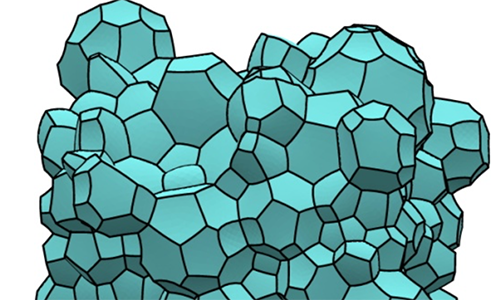Short course: Structure and Mechanics of Liquid and Solid Foams by Andy Kraynik

This two-day short course will explore the relationships between the cellular microstructure of liquid and solid foams and their rheological and mechanical behavior. We will focus on foam geometry at the cell level.
The cells in soap froth are polyhedral gas bubbles separated by thin liquid films that are stabilized against rupture by surfactants. Many commercially important cellular solids, such as food, polymer and metal foams, are formed when liquid foams solidify into structures that have open or closed cells. The growth of spherical gas bubbles in a liquid and their evolution to form the polyhedral cells in low-density foam are key features of foam manufacturing processes, and illustrate the interplay between the mechanics of liquid and solid foams. The cell-level architecture of low-density foams can be viewed as polyhedra that fill space, forming networks of surfaces or edges that can be random or regular. Despite significant progress in understanding foam rheology and mechanics over the last few decades, the complex phenomena that occur at all length scales remain poorly understood.
The course is a mixture of lectures and optional computer exercises.
Price:
Free for PhD-students and academic staff. Other participants: EUR 250 / DKK 1900.
Lecturer:
Andy Kraynik
Following his retirement from Sandia National Laboratories (Albuquerque, US) Prof Andrew Kraynik has held Emeritus positions at Manchester University and the University of Erlangen-Nuremberg.
He is recognised internationally as a world leader in the theoretical and computational mechanics of foams and has previously been President of the Society of Rheology, receiving the Distinguished Service Award of the Society in 2001. His research has focused on foam micromechanics — the rheology of liquid foam, mechanics of solid foam, structure, drainage, and processing. He has also worked in polymer processing, non-Newtonian fluid mechanics, and rheometry (co-developing the helical screw rheometer).
Lecture room:
R545 - 5th floor in grey building
